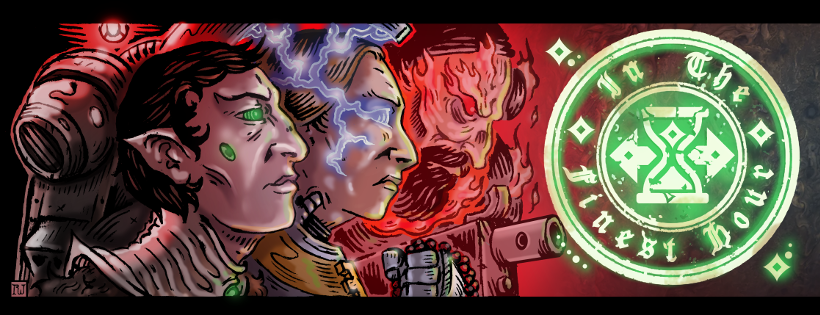“Everyone talks about, math, but no one ever seems to do anything about it.”

There’s a lot of misconceptions about mathhammer that tend to float around, whether it’s not understanding how statistics work and how to apply them, or misusing math and statistics beyond their purposes or even simply distrust of the whole idea of using them in the game because “that’s not how my dice roll” or “well, might roll less/more than that.” So in this episode, we take sometime to clear up a few of these misconceptions.
Of course, if you’re math-phobic, you might find this am intimidating topic, but rest assured- you won’t get any lectures about exes squared or sums over integers in this podcast; instead, we look at how to apply the math and what it means for you as a general, rather than worrying so much about the practice of it. Indeed, why do out all yourself if you have tools that can handle the number-crunching for you? As a bonus feature to go with the show, here are a couple of my favorites:
https://www.mathhammer8thed.com/
https://mathhammer.thefieldsofblood.com
[display_podcast]


Good episode.
Re: (Casino) dice.
I heard it said that casino dice are actually fairly bad (e.g. susceptible to all kinds of trickery) in a typical 40K context, precisely because they aren’t thrown three feet and don’t bounce off a back wall they way they usually have to in an actual casino to be a legitimate throw, and don’t roll over enough precisely because they don’t have rounded edges/corners of board game dice (which have those precisely to work reasonably well as a “random numbers generator” without a full-size las vegas craps table or something along those lines).
Not sure if that is also an urban myth.
Gonna call that one an urban myth. The main reason why cheap dice have rounded edges is so they manufacturer can use the plastic saved to make more dice from the same amount of stock.
The reason casino dice are required to be thrown in such a specific manner is to eliminate skill-throws. You can actually be trained to throw dice in a way that can cause them to land on a specific facing.
And while I do not see skill-throws at 40k tables- I can believe that historically this has been an issue at craps tables.
Yeah, it’s unlikely that you will be able to do that in 40k and not get caught. It’s pretty telling when you know what to look for.
I believe there is a grain of truth to this- casino dice are actually designed to be used in a fairly specific way in order to eliminate “skill throws” (as Reece talks about.) When not used in that way- specifically, when rolled in the way that we often roll dice in our games, where there is a limited space to roll on, the dice can only be thrown with a very limited velocity, and they can’t travel horizontally as far before stopping- casino dice can actually be _less_ statistically random because the focus on the dice’s manufacture is making sure they are weighted properly. However, their sharp corners and large overall size mean that if they don’t get enough momentum, they may not turn over as easily and thus not behave in a truly “random” fashion.
That said, it’s not actually much of an issue even then, since the difference is still a handful of percentage points at best and it’s usually quite obvious if someone is trying to game this effect. Most cheaters are bad at what they do.
The problem with traditional mathhammer is that everyone does experced probabilities, when you should be using binomial probability. The difference is this:
Expected probability: if i shoot 10 BS 4+ shots, i expect 5 hits
Binomial probability: if I shoot 10 BS4+ shots, i have a 62% chance of getting 5 or more hits. Thats not that high! Plus, if I’m planning on getting exactly 5 hits, which many do, I only have a 24% chance of getting that.
Yeah, but it’s a lot easier to do expected values in my head, on the fly, at the table. As long as you have a solid grasp of the difference between the two methods, it’s a perfectly acceptable approximation.